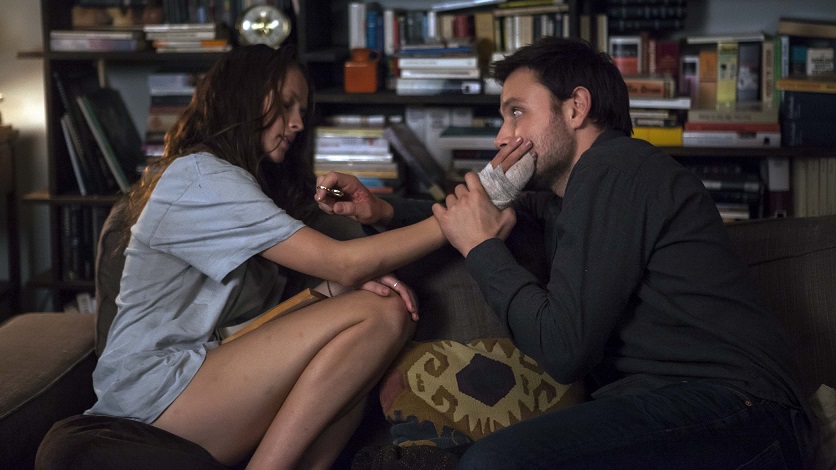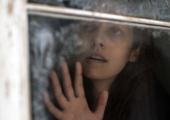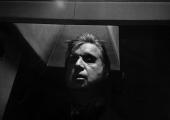There’s an intriguing combination of style and atmosphere in Berlin Syndrome, one that proves that, although director Cate Shortland has embraced genre with conviction, she certainly hasn’t left the arthouse roots that she established with her first two films, her debut Somersault and the much-acclaimed Lore from five years ago, behind. Whether the result finally and fully convinces may be another mattter, especially over a rather protracted length of nearly two hours, but it’s certainly a curious journey.
It begins in laid-back mode, as we encounter heroine Clare (Teresa Palmer, intense) moodily mooching around Berlin. She’s backpacking, taking a career break from her life back in Australia, relishing, rather singly, its ambiance; she’s a photographer, so it’s the visual details that appeal – in particular, the architectural details of the city’s East German past, dreams that have somehow lost their foundation. She seems a rather detached character, and there’s a certain improvisatory transience in her exploring that chimes with the atmosphere around her, her experience of the expected youth scene set off against immersion in old bookshops. (There's an interesting comparison to be made with Sebastian Schipper's 2016 Victoria, another film about an outsider to Berlin who finds her engagement with the city brings more of an adventure than she could ever have expected.)  An apparently chance encounter – hindsight makes us wonder about that – sees her change her plans to travel around Germany. Literally bumping into a local teacher, Andi (Max Riemelt), on the street propels an interaction that grows nicely as he shows her new elements of his city; engaging as well as attractive, he certainly doesn’t pressure her, but whne they end up back at his apartment it comes as no surprise. (Teresa Palmer, Max Riemelt, pictured above)
An apparently chance encounter – hindsight makes us wonder about that – sees her change her plans to travel around Germany. Literally bumping into a local teacher, Andi (Max Riemelt), on the street propels an interaction that grows nicely as he shows her new elements of his city; engaging as well as attractive, he certainly doesn’t pressure her, but whne they end up back at his apartment it comes as no surprise. (Teresa Palmer, Max Riemelt, pictured above)
What does is what follows the next day, after a night as much of intimacy as sexual passion. When Clare wakes up the next day, she discovers she is locked in; worse, her SIM card is gone, and breaking the windows, in fact breaking out at all, is impossible. When Andi returns from his otherwise normal day at school, he seems to be pretending that nothing out of the ordinary has happened. What follows is a precariously balanced interaction that will see their contact move between extremes – from abject captivity, when Clare is left tied to the bed, through to her playing uneasy company, following the “Stockholm Syndrome” concept, when she seems almost to have almost assumed the role that he wants of her.
If the full amplifications of that last element are not entirely convincing, Shortland’s pacing of the film’s thriller elements – its moments of near-escape, and accompanying violence – is accomplished. Revelations about Andi’s life and past – he’s close to his ailing university lecturer father, and obviously estranged from a mother whose past defection to the West has somehow impacted on his character – certainly don’t explain how he got to this state of pathological obsession (and not, we are led to believe, for the first time, either).
Cinematographer Germain McMicking catches the strange intimacy, from first love to lingering hatred via an almost dream-like suspension, that the apartment’s confined space induces, as well as latching onto all the elements of colour – and their nicely balanced combinations – that supporting scenes offer when the action briefly moves into the open air. The only extra on this release is a 14-minute "behind-the-scenes" featurette, from which we learn that the project originated with producer Polly Stanford finding Australian writer Melanie Joosten’s eponymous 2011 source novel at a festival publisher’s pitch. The impetus for Berlin Syndrome may indeed have come from the producer's side, but its style is very much auteur-crossover (its festival premiere came, of course, at Sundance). It’s a powerful two-hander, well played by both principles, but finally rather more intriguing than it is fully engrossing.
Overleaf: watch the trailer for Berlin Syndrome



 An apparently chance encounter – hindsight makes us wonder about that – sees her change her plans to travel around Germany. Literally bumping into a local teacher, Andi (Max Riemelt), on the street propels an interaction that grows nicely as he shows her new elements of his city; engaging as well as attractive, he certainly doesn’t pressure her, but whne they end up back at his apartment it comes as no surprise. (Teresa Palmer, Max Riemelt, pictured above)
An apparently chance encounter – hindsight makes us wonder about that – sees her change her plans to travel around Germany. Literally bumping into a local teacher, Andi (Max Riemelt), on the street propels an interaction that grows nicely as he shows her new elements of his city; engaging as well as attractive, he certainly doesn’t pressure her, but whne they end up back at his apartment it comes as no surprise. (Teresa Palmer, Max Riemelt, pictured above)






